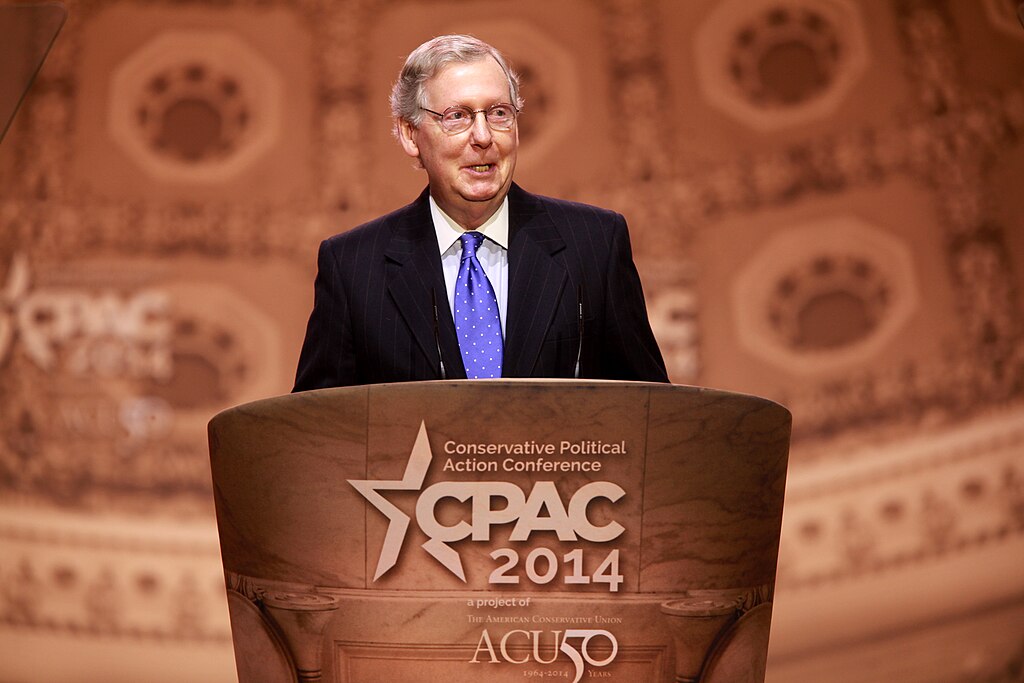In a move that may widen the rift within the Republican Party, Senate Minority Leader Mitch McConnell is reportedly opposing President-elect Donald Trump’s calls for recess appointments, potentially setting the stage for a dramatic confrontation between the GOP’s old guard and its Trump-aligned faction.
McConnell, according to sources familiar with the matter, made his position clear during a private event on Sunday night attended by top Republican donors and strategists. The senator is said to have expressed concerns that allowing Trump to make recess appointments could set a dangerous precedent and further erode Senate authority over confirmations.
Recess appointments, a constitutional mechanism allowing a president to fill government vacancies without Senate confirmation during recess periods, have long been controversial. Trump, who has faced resistance from Senate Republicans over some of his proposed Cabinet nominees, is reportedly considering this option as a way to bypass prolonged confirmation battles. However, McConnell’s resistance could significantly complicate those plans.
A GOP Divide Emerges
The opposition from McConnell reflects a growing divide within the Republican Party as Trump prepares to assume office. While some GOP lawmakers and donors have rallied behind the president-elect’s unconventional approach to governance, others remain wary of actions they see as undermining the checks and balances enshrined in the Constitution.
Political analysts say McConnell’s stance could create friction within the Republican-controlled Senate, particularly as Trump’s allies push to expedite the confirmation of key appointments in areas like defense, immigration, and energy policy.
“McConnell’s reported position signals a reluctance to cede any institutional power, even to a president from his own party,” said constitutional law expert Laura Henderson. “This could spark a significant intra-party battle.”
Trump’s Allies Push Back
Pro-Trump Republicans are already signaling their discontent with McConnell’s resistance. Some have accused the Senate leader of obstructing the president-elect’s agenda, a charge that echoes Trump’s past criticisms of McConnell during his first term in office.
Trump himself has not commented publicly on McConnell’s reported opposition, but his advisors have hinted that the president-elect is prepared to escalate the matter if necessary. “The president-elect is focused on delivering results for the American people, and that means ensuring his team is in place as soon as possible,” said one senior Trump aide who requested anonymity.
Potential Fallout
The clash over recess appointments could have broader implications for the GOP’s unity heading into 2025. Trump’s supporters argue that bypassing the Senate is necessary to overcome what they see as deliberate delays and partisan obstruction. Critics, however, warn that such actions could alienate moderate Republicans and create long-term institutional damage.
For McConnell, the stakes are equally high. If his opposition holds, he risks further antagonizing Trump’s base, which remains a powerful force within the Republican electorate. On the other hand, yielding to Trump’s demands could weaken the Senate’s authority and set a precedent for future administrations.
As the debate unfolds, all eyes will be on Capitol Hill, where Republicans must navigate the delicate balance of supporting their party’s leader while preserving the institution’s integrity



 Germany and China Reaffirm Open Trade and Strategic Partnership in Landmark Beijing Visit
Germany and China Reaffirm Open Trade and Strategic Partnership in Landmark Beijing Visit  Pentagon to Halt Ivy League Programs for U.S. Military Officers Starting 2026
Pentagon to Halt Ivy League Programs for U.S. Military Officers Starting 2026  Denver Mayor Orders Police to Protect Protesters, Restricts ICE Access to City Property
Denver Mayor Orders Police to Protect Protesters, Restricts ICE Access to City Property  Netanyahu Suggests Iran’s Supreme Leader Khamenei May Have Been Killed in Israeli-U.S. Strikes
Netanyahu Suggests Iran’s Supreme Leader Khamenei May Have Been Killed in Israeli-U.S. Strikes  USITC to Review Impact of Revoking China’s PNTR Status, Potentially Raising Tariffs on Chinese Imports
USITC to Review Impact of Revoking China’s PNTR Status, Potentially Raising Tariffs on Chinese Imports  Venezuela Oil Exports to Reach $2 Billion Under U.S.-Led Supply Agreement
Venezuela Oil Exports to Reach $2 Billion Under U.S.-Led Supply Agreement  Philippines, U.S., and Japan Conduct Joint Naval Drills in South China Sea to Boost Maritime Security
Philippines, U.S., and Japan Conduct Joint Naval Drills in South China Sea to Boost Maritime Security  Russia Signals Openness to U.S. Security Guarantees for Ukraine at Geneva Peace Talks
Russia Signals Openness to U.S. Security Guarantees for Ukraine at Geneva Peace Talks  Trump Floats “Friendly Takeover” of Cuba as Rubio Reportedly Engages in Talks
Trump Floats “Friendly Takeover” of Cuba as Rubio Reportedly Engages in Talks  Trump Warns Iran as Gulf Conflict Disrupts Oil Markets and Global Trade
Trump Warns Iran as Gulf Conflict Disrupts Oil Markets and Global Trade  Australian PM Calls Alleged Western Australia Terror Plot “Deeply Shocking” After Arrest
Australian PM Calls Alleged Western Australia Terror Plot “Deeply Shocking” After Arrest  HHS Adds New Members to Vaccine Advisory Panel Amid Legal and Market Uncertainty
HHS Adds New Members to Vaccine Advisory Panel Amid Legal and Market Uncertainty  Israel Launches Fresh Strikes on Iran After Death of Supreme Leader Ayatollah Khamenei
Israel Launches Fresh Strikes on Iran After Death of Supreme Leader Ayatollah Khamenei  Pakistan-Afghanistan Tensions Escalate as Taliban Offer Talks After Airstrikes
Pakistan-Afghanistan Tensions Escalate as Taliban Offer Talks After Airstrikes  Trump Orders Federal Agencies to Halt Use of Anthropic AI Technology
Trump Orders Federal Agencies to Halt Use of Anthropic AI Technology  Trump to Address Nation as U.S. Launches Strikes in Iran, Axios Reports
Trump to Address Nation as U.S. Launches Strikes in Iran, Axios Reports  Iran Supreme Leader Ayatollah Ali Khamenei Killed in Israeli, U.S. Strikes: Reuters
Iran Supreme Leader Ayatollah Ali Khamenei Killed in Israeli, U.S. Strikes: Reuters 































